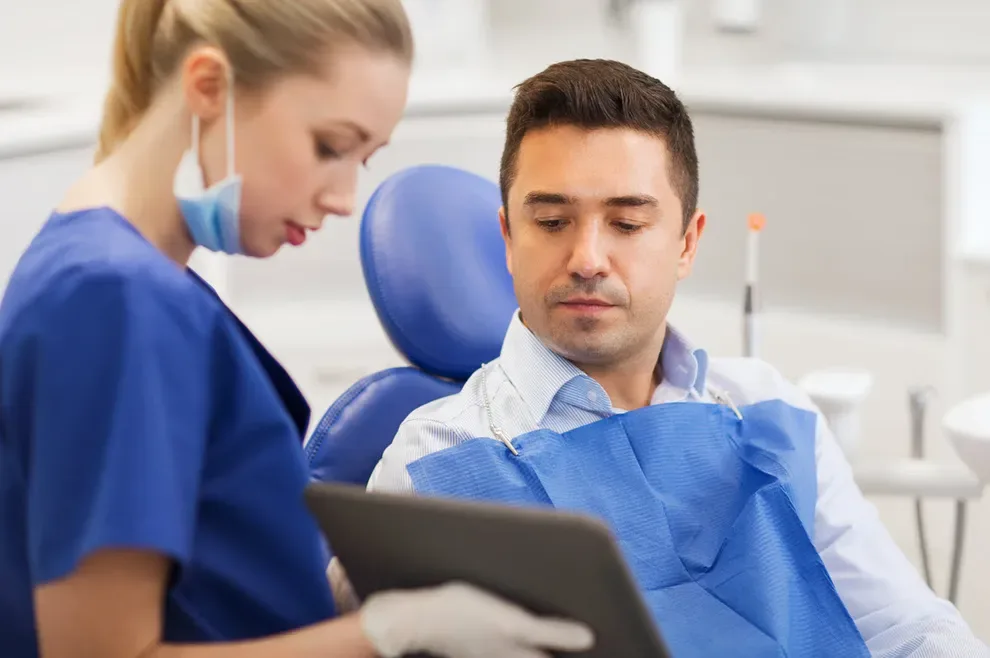The Link Between HPV and Oropharyngeal Cancer

Table of Contents
- HPV & Oropharyngeal Cancer
- Prevalence
- Symptoms
- Risk Factors
- Can HPV Vaccine Prevent Oropharyngeal Cancers?
- Frequently Asked Questions
- References
Human Papillomavirus (HPV) is a serious virus affects the moist membranes of your throat, mouth, cervix and skin. It spreads primarily through skin-to-skin contact and is the most common sexually transmitted infection. Researchers estimate more than 80 percent of people will contract some form of HPV in their lifetime.
While the virus typically transmits through sexual contact, you do not have to have sexual intercourse to contract it. Humans can transmit HPV through genital contact, anal sex, oral sex or touching. Some evidence suggests the virus can be passed on through a deep kiss.
There are more than 100 different forms of HPV, with more than 40 of them spreading through direct sexual contact.
How HPV Can Contribute to Oropharyngeal Cancer
Research shows HPV linked to some forms of cancer, including oral cancers, and some forms of HPV are spread through oral sex. Cancers in the throat and mouth are often referred to as neck and head cancers, and include these areas:
Areas that connect the throat (nasopharynx) and nose
Mouth
Larynx (voice box)
Tongue
Lip
Primary risk factors for developing cancer in your mouth and throat are smoking, chewing tobacco and drinking alcohol. However, there a growing amount of evidence shows HPV causing an increase of these cancers.
Research indicates about one in four mouth cancers and one in three throat cancers are related to HPV.
Prevalence of HPV-Positive Throat Cancer
Doctors diagnose more than 46,000 new cases of cancer in people whose bodies test positive for HPV, and the virus is responsible for more than 36,000 of the cases. Parts of the body where HPV-related cancer is discovered include the:
Rectum
Cervix
Vagina
Anus
Vulva
Penis
Back of the throat (oropharynx)
Base of the tongue
Tonsils
Research indicates HPV-associated cancers were found by looking at the different body parts where cancer has been detected. It has been concluded those that were found in these certain body parts are more than likely caused by HPV.
Symptoms of Oropharyngeal Cancer
Oropharyngeal cancer stems from an uncontrolled buildup of abnormal cells caused by tobacco products and alcohol. These products damage the cell linings in your throat and mouth. Cancer develops in the middle portion of your throat.
Symptoms of oropharyngeal cancer include:
Coughing up blood
White patch in your mouth
A lump in the mouth, neck, or throat that won't go away
A sore throat that will not go away
Ear pain that will not go away
Difficulty or pain when swallowing
Unexplained weight loss
Trouble or difficulty opening your mouth fully
Difficulty moving your tongue
Voice changes that do not go away
This cancer is also related to the HPV virus which makes proteins interfere with your gene's normal growth. Uncontrolled cell growth can be responsible for cancer. HPV infection is one of the most common causes of oropharyngeal cancer. Cases of HPV-related cancer are on the rise.
Risk Factors
Among the risk factors that can increase your chances of developing oropharyngeal cancer are:
A history of neck and head cancer
A history of smoking
A history of radiation therapy to your neck and head
Excess weight
A heavy use of alcohol
Contracting HPV, particularly HPV type 16
Lengthy histories of smoking, consuming copious amounts of alcohol and carrying excess body weight are the largest contributors to HPV-related cancers.
Strong evidence supports the notion that your body converts alcohol into acetaldehyde. Acetaldehyde is a potent carcinogen. Alcohol is suspected to act as a solvent which makes it easier for carcinogens to penetrate into cells lining your colon. Drinking alcohol excessively can affect how your body repairs DNA damage and defends against free radicals.
Research is showing excess body fat puts you at a greater risk for oral cancers. Obesity is shown to stimulate your inflammatory response that can promote cancer development
Can HPV Vaccine Prevent Oropharyngeal Cancers?
The HPV vaccine was created to prevent cancers of the reproductive system and cervix. This vaccine will protect against HPV that is responsible for oropharyngeal cancers, so it may be able to prevent oropharyngeal cancers as well.
The CDC recommends this vaccine be given to 11- to 12-year-olds and for everyone through the age of 26 if they were not vaccinated earlier. Doctors to not recommended the vaccine for anyone older than 26.
Some adults 27 to 45 should inquire with their doctor to see if the doctor can check with their doctor to learn if the vaccine is recommended for them.
The HPV vaccine will prevent new infections but cannot treat existing diseases or infections. That is why it is recommended for those at younger ages to prevent any exposures.
FAQs
HPV can affect your throat and mouth and cause oropharyngeal cancer. This virus is estimated to cause more than 70 percent of oropharyngeal cancers every year in the United States.
According to data found by the CDC these are some of the percentages of U.S. HPV-attributable cancer cases each year are:
Cervix 91 percent
Vagina 75 percent
Vulva 69 percent
Penis 63 percent
Anus 91 percent
Female 93 percent
Male 89 percent
Oropharynx 70 percent
This data comes from population-based cancer registries that participated in the CDCs program from 2014-2018 and covers about 98 percent of the U.S. population. The CDC applied specific criteria when determining which cancers were most likely associated with HPV.
